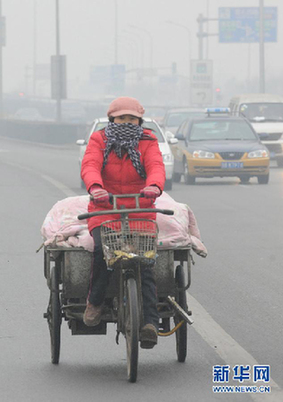Air pollution: Top concern in Beijing

 0 Comment(s)
0 Comment(s) Print
Print E-mail CNTV, January 29, 2013
E-mail CNTV, January 29, 2013
Air quality in Beijing is ranked the third worst out of 113 cities, according to China's Ministry of Environmental Protection. With dense smog in the capital raising health concerns among residents, improving the environment has become a top priority.
Beijing has been hit by smog for the fourth time already this month. Visibility was down to less than 200 meters in some areas of the capital on Monday.
|
Beijing is shrouded by heavy fog on Jan. 28, 2013. |
To make it easier to monitor and publicize air quality data, many cities lump both hazy and foggy weather together. However, the head of the Atmospheric Environment Management Office of the Beijing Environmental Protection Bureau says that it is necessary to differentiate between the two concepts, as fog contains no pollution.
As Yu Jianhua from Beijing Environmental Protection Bureau said, "Fog is mainly formed by vapor, while haze is formed mainly by dust."
Meterological departments across the nation have begun releasing the PM 2.5 index since the start of the year. The index measures particulate matter per cubic meter.
The index in Beijing has been very high in recent times.
"The air quality in Beijing hasn't reached the national standard," said Yu.
Reaching the national standard in Beijing will take at least 18 to 20 years, according to the Beijing Environmental Protection Bureau.
Measures have already been taken to improve the situation.
Yu Jianhua said, "To prevent further pollution, we'll raise the threshold for new enterprises to enter Beijing. We'll also ask the highly polluting factories to shut down, and update the current standards to press enterprises to contribute more for a better environment."
Studies show that most of the pollution comes from coal burning, motor vehicles, industrial emissions and dust.






